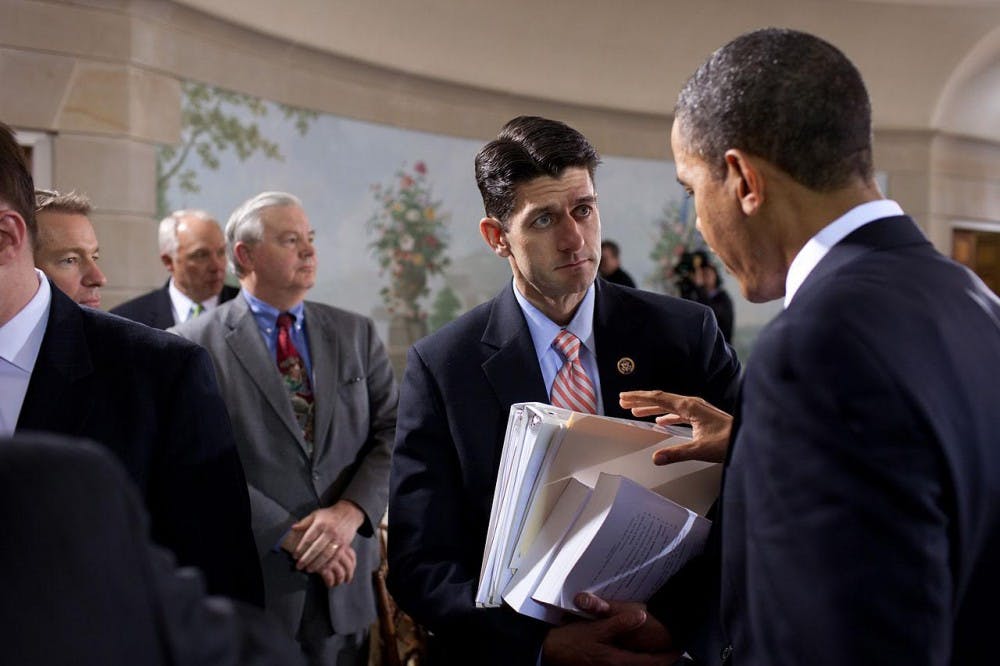It should come as no surprise House Speaker Paul Ryan and President Donald Trump’s American Health Care Act, or AHCA, failed miserably when actually put to the test. For the past seven years, Republicans have relied on rhetoric and theoretical debate about the “repeal and replace” of Obamacare. The bill itself was ill-prepared for the rigors of what American health care requires and members on both sides of the aisle condemned it to a necessary defeat. Several congressmen have come out and offered their two cents about how to autopsy and revamp the bill. Especially after Trump chastised Congress about its purported ineptitude, several politicians — namely Gov. John Kasich (R-Ohio) — came out claiming the Trump administration needs to work with the Democrats in order for the bill to have a chance of passing. Trump’s following, like Jeanine Pirro of Fox News, lambasted Ryan, calling for him to step down as Speaker of the House since “he failed to deliver votes on his health care bill.” Trump and his administration must stop pointing fingers and work with Republicans and Democrats to ensure millions of Americans are not left uninsured.
As it stands right now, AHCA will not provide affordable health care for everyone, but will instead decrease anticipated health care coverage in a dramatic fashion. In fact, the Congressional Budget Office anticipates that by next year, the number of individuals with health care coverage will drop 14 million and will continue to drop thereafter. What’s worse is that the federal government is essentially subsidizing the drop in health care coverage by removing individual mandates. If individuals are no longer required to sign up for health care, we will experience the disastrous consequences of a tragedy of the commons.
Additionally, while Trump and his administration pledged to leave Medicaid untainted, the AHCA calls for a cap on federal expenditures with regards to Medicaid. This provision represents an unprecedented and active antithesis to what the White House administration reported since Medicaid would not just be affected, but would be most likely significantly curtailed in the amount of funds it provides and people it services.
Even before they attempt to appease the Democrats with a slackening of a conservative bias for the health care bill, they need to convince their fellow Republicans the bill is right for America. As many as 30 Republicans were vocal in their opposition to the GOP’s replacement for Obamacare. Sen. Ted Cruz (R-Texas) repeatedly mentioned it was simply callous and cavalier for Trump and Ryan to present such an emaciated plan which was severely lacking in several necessities to become a true Obamacare successor. Gov. Kasich spoke out against AHCA since it curtailed the quantity of federal funds allocated towards Medicaid. Kasich and a few other governors have continued to expand Medicaid over the past several years and want to further broaden Medicaid coverage. In Ohio, Kasich notes Medicaid has covered more people than any other health care initiative.
Many of the Republican naysayers had valid points — for one, the Congressional Budget Office estimated premiums would continue to rise under AHCA. Trump planned to decrease federal funding for Medicaid, but by shifting that fiscal responsibility to the states, high-cost states would have significantly less affordable health insurance. Trump also planned to increase premiums for older individuals while keeping them low for young people, which would cause premiums to increase over the next two years. One of the biggest flaws of AHCA was the capping of federal Medicaid expenditures. By doing so, while Trump and Ryan think they may be saving money in the short-term, the loss of coverage for individuals previously-insured through Medicaid might actually drive up premium prices. Trump cannot shift a 350 million dollar Medicaid responsibility to the states. As such, AHCA must be amended to either leave Medicaid expansion untouched or cap Medicaid at a much more reasonable federal funding level.
Additionally, AHCA planned to leave approximately 20 million Americans uninsured as compared to Obamacare coverage by 2020. If Trump and Ryan want this bill in a passable form, they need to drastically increase the quantity of individuals covered. Granted, some Republicans criticized the bill because the federal government was too patronizing of its citizens with regards to health care, but a much greater majority (which included Democrats and Republicans) want to ensure their constituents are covered affordably. This means a future proposal needs individual mandates back to make sure employers are not the only responsible party in health care insurance for all.
Perhaps most concerning of all is after the AHCA debacle, Trump claims he will let Obamacare “explode” and then find a solution. Just because this iteration failed does not mean we wallow in defeat and move on to other facets of politics. If Obamacare does implode, we will need a quick and effective replacement.
Trump needs to get his priorities straight and work towards his campaign promises. The “old college try” phenomenon does not apply here. Since millions of Americans’ fates are in the hands of Trump, Ryan and their Republican colleagues, it is time they put their nose to the grindstone to churn out an affordable, more universal health care plan.
Sean Sequeira is an Opinion columnist for The Cavalier Daily. He may be reached at opinion@cavalierdaily.com.





